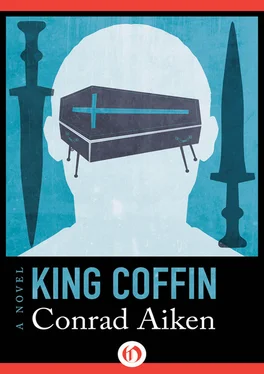Karl Jones had suddenly become new — he was being seen for the first time.
Bareheaded, wearing again his old black sweater, grinning a little self-consciously, as if something in the occasion made him shy, and as if he were trying to carry it off with bravado, he came down the wooden steps of the Alpine Street house with a small striped mattress over his shoulder and a worn suitcase in his hand. The suitcase he dropped on the cement sidewalk, where already stood a white-painted chair, such as are seen in hospitals, a Gladstone bag, a porcelain slop bowl, and a brown wicker hamper. He flung the mattress into the back of the open model-T Ford which waited at the curb, balancing it carefully over the child’s cot which reared its white legs and bright brass casters into the air. A middle-aged woman followed him down the steps, bringing a rope; with this they proceeded to knot the mattress into place, first throwing a patchwork quilt over the whole shapeless pile. Then the hamper was with some difficulty wedged into the front, beside the driver’s seat: it was heavy, tied with cord, and what looked like bed linen protruded from the gaping lid. As the woman reascended the steps Jones called after her:
— Guess we’ll have to carry the rest! Hope you don’t mind!
What she said was inaudible, she waved a hand, entered the house, and in a moment reappeared accompanied by a man. The man climbed into the front seat, slammed the tin door, started the car and began turning it. Jones lifted the slop bowl by its handle, laughing, his head tilted to one side: the woman seated herself in the white chair on the sidewalk. She too was laughing, leaning forward and clapping her hands on her knees. When Jones said something to her, she got up, took the slop bowl from him, picked up the suitcase, and began walking away towards Reservoir Street. Jones swung the chair up against his shoulder, seized the handle of the Gladstone bag, and followed.
The whole thing was unreal: it had no existence.
The woman might be a trained nurse: she was wearing a dark cloak from beneath which, as she walked, flashed the white of what appeared to be a uniform.
And the child’s cot — what about that? If there was a child, in the Reservoir Street house, why had he seen no sign of it in all this time? And if the child was ill — as the presence of the nurse seemed to suggest — then it was difficult to account for the queer cheerfulness of the scene. The logic was a little wrong.…
He sat still, watched them turn the far corner at last, vanish out of sight. They had not noticed him, it would be easy enough to drive slowly through Reservoir Street and observe the end of this peculiar ceremony, but for some obscure reason he felt apathetic, indifferent. It hardly mattered: he had already seen more than he expected anyway, he had not really intended to come here at all, had simply made a last-minute detour on his way to meet Gerta. The thing was a windfall, it was in a sense outside the routine, needn’t be too much bothered about. Just the same, it was certainly odd, among other things, that Jones should be here, and not at his office — it was three o’clock.
And this indifference, this apathy—
It was a part of the time problem.
He tapped a fingernail on his watch, frowned, opened the window to knock the ashes out of his pipe. It had certainly become unexpectedly difficult, unexpectedly vague — the queer thing was the way in which, from the moment when he had actually found Jones, marked him down, begun to learn about him and know him, the element of hurry, of pressure, had begun subtly to dissolve. It was as if abruptly he had stepped out of time into timelessness: what need could there be, any longer, for hurry? Jones was not only there , he was here : Jones had joined him, had joined his life: it was almost, in fact, as if Jones had become a part of his own “ self .” He had again that queer feeling of encroachment, as if his image were walking toward him out of a mirror, or his shadow somehow falling on his own body; the feeling was not unpleasant, brought with it a sense of power, a sense of agreeable duplicity; but also in it was something a little disconcerting, or even dangerous. It was all very well for Toppan to say, in his smug insinuating fashion, that there wasn’t any point in going on with it after a certain time — how could Toppan know anything about it? The pure vision — this was (as in the beginning he had of course not been able to foresee) the period of pure vision! To sit back and watch, to wait here now, for instance, actually foregoing his power to watch, was a very nearly perfect thing. It was comparable to the artist’s intuition of the completed work of art: Jones was in the process of becoming an artifact. He remembered saying to Gerta—“an action could have the purity of a work of art. It could be as abstract and absolute as a problem in algebra.…”
Wasn’t that still true?
Of course: and more than ever necessary. What must be kept firmly in mind was the inherent necessity . If the world was logical at all, then it must be logical in every item. And if it was despicable, if humanity was despicable, and if one was to sound one’s contempt for it to the bottom, separate oneself from it, then the final and inevitable action in the series would be simply an act of destruction: it would be the only natural purification. It was not, in this sense, dictated so much by hatred as by a need for purification. Was that it? Or not hate only , at all events. It was the need of the superior being to separate himself violently from the one-who-wants-to-be-killed, the inferior, the crowd.…
He smiled, recapitulating; the whole thing summed itself up neatly and decisively; the constellation of events became once more precise and orderly. Gerta, Sandbach, Toppan, Jones — they were arranged and fell into place, the clock moved them in its geometrical orbit, their voices and faces faded as they passed, became vivid as they approached, faded again. Toppan’s suspicions were powerless to take any shape in action; Sandbach’s guesswork was too far off to find any accuracy of aim, his emotions too confused for any singleness of purpose; Gerta’s devotion would continue, until too late, to constitute for her an effective paralysis. They circled with the clock, they watched as they moved, but their fixed orbit, fixed by himself, would never bring them any nearer to him. They, as much as Jones, were his own creation, they were falling into their grooves, they no longer had any freedom of will. To all intents, they had become puppets.
Two children, a boy and a girl, ran past him bowling iron hoops, the wooden sticks ringing dully on the metal, clanking regularly, the shrill voices raised in a meaningless and unintelligible gabble. An immense pile of white clouds had come up from the southwest, the sun went out, the afternoon became gray.
He took Gerta’s letter from his pocket, opened it on his knee.
Jasper my dear — I suppose you suggested the place in Belmont because you knew I’d be teaching there in the afternoon, but I wish you had taken the trouble to let me know a little sooner, it’s not too convenient — and don’t you take a good deal for granted? I don’t quite know why you should assume — as you appear to — that your plans are of such importance to me. If you had wanted to see me, any time in the past fortnight, you could easily have done so: and why you should now want to be so spectacular — shall I say melodramatic? — about our meeting I confess I don’t see. Don’t you think the whole thing is becoming a trifle absurd? Why on earth should I want to watch you at revolver practice? Don’t be ridiculous! However, I am a little concerned about you, for Julius says you look ill and haven’t been sleeping, and of course I won’t pretend that I wouldn’t like to see you, so I’ll be there as soon as I can get away from Miss Bottrall’s dreadful little life class. I’d be somewhat relieved if you’d kindly forget to bring your revolver. It hardly seems necessary. Gerta.
Читать дальше












